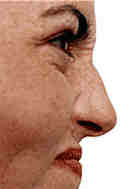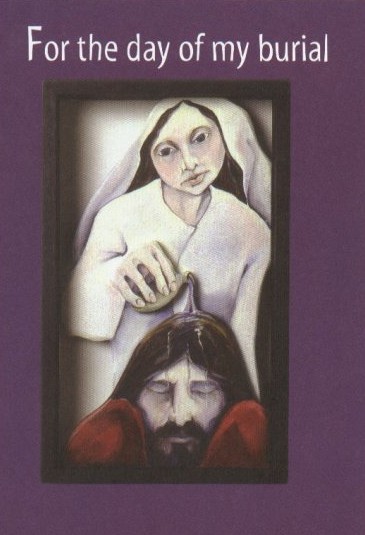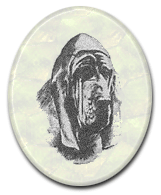

"For the day of my burial"
Message preached April 1,
2001
Long Green Valley Church of the Brethren
Glen Arm, Maryland USA
based upon John
12:1-8
|
|
It has been said that women have a better sense of smell than men. Do you agree with that? Itís definitely the case in my household, where the womenfolk are much more sensitive to the aromas that waft through the place than us menfolk. Sometimes I wonder if the blindness of which I am occasionally accused - you know, not "seeing" things that need to be done around the house - doesnít somehow involve the sense of "smell." My wife seems adept at "smelling out" such stuff. Maybe, instead of saying, "donít you see the mess?" she should ask, "donít you smell it?" Then I could honestly respond, "no." After all, science has now confirmed that the female nose is much better than the male nose. Please hear me right. I didnít just admit that my wife "knows" better than I - that sheís smarter. She just has a better sense of smell. (ahem!) |
|
"Smell" is a key ingredient in this morningís gospel lesson. The story, as it is told by John, takes place in the home of three siblings: Martha, Lazarus, and Mary. They are good friends of Jesus. Their home is a welcome refuge for him and his disciples. We all need such a place where we can "let our hair down," so to speak, where we can be ourselves. Thatís especially true when youíre on the road a lot, like this rabbi and his followers were.
Perhaps you recall another story (Luke
10:38-42) of this brother and his two sisters, the one where Martha
and Mary each have their own way of relating to Jesus. In that episode, Martha, ever the
gracious hostess, concerned herself with making sure everyone was fed when
visiting their home. Her interaction with the Lord was through a plate of food,
serving him as a woman was expected to do for a man. In that story, however,
Martha was upset over Maryís behavior. If you remember, Mary wasnít helping
in the kitchen, like Martha thought she shouldíve been. She was out with the
menfolk, just sitting at Jesusí feet, listening. "Didnít she see
everything that needed to be done," sister Martha thought. "This
stinks!"
have their own way of relating to Jesus. In that episode, Martha, ever the
gracious hostess, concerned herself with making sure everyone was fed when
visiting their home. Her interaction with the Lord was through a plate of food,
serving him as a woman was expected to do for a man. In that story, however,
Martha was upset over Maryís behavior. If you remember, Mary wasnít helping
in the kitchen, like Martha thought she shouldíve been. She was out with the
menfolk, just sitting at Jesusí feet, listening. "Didnít she see
everything that needed to be done," sister Martha thought. "This
stinks!"
When Martha voiced her concern to Jesus, he responded with a line that a husband should never say to his wife (that is, if he wants to live in the same house). Only our Lord could say it, and even then itís not an easy comment to chew on - or so Iíve been told by the opposite gender. "Martha, Martha," he said, "you are worried and distracted by many things; there is need of only one thing. Mary has chosen the better part, which will not be taken away from her." (Luke 10:41-42) You know, that particular Bible story ends right there in Lukeís gospel. It doesnít indicate what, if anything, Martha might have said or done in response. Women in that day may not have been as free to speak their mind as today, but I canít imagine Martha letting a man have the last word. "Yes, Lord," I imagine her saying (perhaps muttering it in the soup), "thatís easy for you to say." Of course, this wasnít just any man. It was Jesus.
Indeed it was, and Mary was there at his feet, listening. Thatís what a disciple does - sit at the feet of the teacher. Thatís what Peter, James, John, and all the rest did. You soak up not just the words, but also the actions, the essence - if you will - of the one you follow. Learning involves more than mere instruction. A person learns by taking in the character of the teacher - watching what he does, listening to what he says, tasting the truth of it all, feeling the reality of it, getting a whiff of the personality behind the words. Thatís what Mary was doing. Perhaps her sister Martha was just a bit jealous... Anyway, thatís Lukeís story, an account not found in Johnís gospel - though you kind of wonder if that episode isnít somewhere in the background of this morningís scripture.
If you were listening, you heard that Mary was again at Jesusí feet. Only this time she wasnít just sitting. No, in this story Mary was on the move. She brought out an expensive jar of aromatic oil and poured it all upon those very feet, and then wiped them with her hair. According to John, "the house was filled with the fragrance of the oil." I told you "smell" was a key ingredient in this morningís lesson.
 Now, looking at the painting on the front cover of your bulletin, you might be a
bit confused. After all, there the woman is pouring the oil on Jesusí head,
not his feet. Actually, the painter is thinking of another version of this tale,
one told by both Matthew and Mark. According to them, it was some nameless
"woman" who anointed Jesus with costly perfume, and she stood above
him as he sat at the table, pouring it over his hair. Though Judas is not
identified as the speaker, both Matthew and Mark remember the same question of
this action, "why waste such expense when the poor could be fed with
it?" They also recall Jesus linking the oil with his upcoming death, that
somehow this woman (be she some nameless person or, as John states, Jesusí
friend and disciple, Mary) was even now preparing his body for the grave.
Now, looking at the painting on the front cover of your bulletin, you might be a
bit confused. After all, there the woman is pouring the oil on Jesusí head,
not his feet. Actually, the painter is thinking of another version of this tale,
one told by both Matthew and Mark. According to them, it was some nameless
"woman" who anointed Jesus with costly perfume, and she stood above
him as he sat at the table, pouring it over his hair. Though Judas is not
identified as the speaker, both Matthew and Mark remember the same question of
this action, "why waste such expense when the poor could be fed with
it?" They also recall Jesus linking the oil with his upcoming death, that
somehow this woman (be she some nameless person or, as John states, Jesusí
friend and disciple, Mary) was even now preparing his body for the grave.
[Bulletin cover art by Paul Grout.
From Church of the Brethren Living Word Bulletin series,
copyright 2001. Used by permission of Paul Grout.]
Why did Jesus again have to spoil a nice meal by discussing something so morbid? The disciples still werenít making the connection which we, having heard the rest of the story, are privileged to see. The idea that Jesus was heading toward the cross was not yet on their mental radar screen, even with all the talk. They had barely caught a whiff of it, though not enough to pervade their senses. Of course, soon enough the odor of it would overwhelm them.
I find the differences in the gospel accounts of various events, such as this one of Jesus being anointed with oil, fascinating. I donít see variations as discrepancies which somehow prove itís all a figment of overactive imaginations. No, instead I see something so awesome it could just not be told in the same way, especially several years down the road when these accounts were finally recorded on paper in the form in which we have received them.
I continue to be blown away by how John relates the story. In order to catch the real fragrance of this mealtime anointing of Jesus by Mary, as John tells it, we need to back up a step or two and smell what lies around it - sort of like what a good hound dog might do. Isnít that kind of what preachers are? We sniff around and bark, thus pointing the way.
 Backing up a few steps in Johnís gospel, this hound dog smells something
interesting. There we find a story of a death. Who died? Lazarus, the brother of
Mary and Martha. Now wait one cotton-pickiní minute here! In the story that
follows, Lazarus is sitting around the table with Jesus, as healthy as any of
them - but in the preceding chapter heís as dead as a door nail. What gives?
Usually itís the other way around, unless weíre watching some horror flick
like "Night of the Living Dead." In our experience, a loved one doesnít
get to eat at their own funeral dinner. (Sniff, sniff. Bark!) Something funny is
going on here!
Backing up a few steps in Johnís gospel, this hound dog smells something
interesting. There we find a story of a death. Who died? Lazarus, the brother of
Mary and Martha. Now wait one cotton-pickiní minute here! In the story that
follows, Lazarus is sitting around the table with Jesus, as healthy as any of
them - but in the preceding chapter heís as dead as a door nail. What gives?
Usually itís the other way around, unless weíre watching some horror flick
like "Night of the Living Dead." In our experience, a loved one doesnít
get to eat at their own funeral dinner. (Sniff, sniff. Bark!) Something funny is
going on here!
Literally, it stinks! Thatís right. It says that when Jesus arrived in Bethany following Lazarusí death, the body had been in the grave four days. When our Lord insisted on going to the tomb, asking that the stone in front of it be rolled away, folks balked, for "already there (was) a stench" about it (John 11:39). Canít you see people covering their noses, preparing for nausea? "Did I not tell you that if you believed, you would see the glory of God?" Jesus said (John 11:40). Yes, Lord. Pass some of that perfume over here, Ed. Maybe itíll cover up some of the smell. This ainít going to be pleasant.
And Jesus shouted, "Lazarus, come out!" ... and he did! He rose from the grave! Fortunately scripture spares us further description of what this brother of Mary and Martha looked or smelled like at that point. But this hound dog smells something unexpected, like "life" instead of "death." The fragrance of it is unmistakable. Just a few minutes earlier Jesus had said to Martha, in words she didnít really comprehend yet, let alone believe: "I am the resurrection and the life. Those who believe in me, even though they die, will live, and everyone who lives and believes in me will never die" (John 11:25-26). Dog-gone it, as a preacher, if I have to make a fool of myself, I will. Did you catch a whiff? (Sniff! Sniff! Bark!)
Fast forward to that meal table in the home of Lazarus, Martha, and Mary. What happened previously in the town cemetery no doubt filled the senses of everyone there. But how do you talk about something like that? When I think of Mary at the feet of Jesus then, I remember myself at my fathersí feet in the hospital not long before he died. What do you say at a moment like that? How do you convey what youíre feeling? I struggle myself to bring such feeling to the surface. It tends to come out in other ways. I understand what Mary did, coming from some part of herself within which she may not have been able to explain, let alone understand. The cost of the oil was a non-issue. If anything, it was too cheap. "Shut up!, Judas."
She put into her hands what she couldnít speak from her lips. And, as often happens with us, her action took on new meaning after she did it. Though probably not conscious of the fact, Mary was preparing Jesusí body for death. They didnít leave that up to the undertaker back in those days. The family took the deceased and lovingly washed the body one last time, using fragrant oil, then wrapped it in a shroud. If you recall, there wasnít time on the Friday when Jesus died for them to properly prepare his body. Sabbath was coming at sunset, and you donít even do that kind of work on the day of rest.
It was on the third day of death, when the women came with their water and aromatic oil to finish the job, that something new was discovered. Like at Bethany, the stone had been rolled away, and the tomb was empty. (Sniff, sniff! Bark!). Mary had, indeed, earlier been the one who last anointed Jesus - preparing him for death. The fragrance of that oil could still be smelled. Only now, it was like the aroma of an offering to God. For that is what Jesus had done upon the cross. He gave his life as an offering, a sacrifice for us (cf. Ephesians 5:2).
Do you smell it? I mean, really? Even us menfolk can catch a whiff of it. The aroma of his love literally fills this room, even today! And you know what? The fragrance of it is filling the world...
Of course, thereís more to our journey through the season of Lent. The next day after this meal in Bethany, where Mary anointed Jesus in Johnís gospel - the next day Jesus entered Jerusalem. The crowds waved palm branches and shouted "Hosanna!..." Guess what we remember next week? Itís Palm Sunday, the beginning of his passion.
Letís end this message with a song ("The Messiah has loved us"), still smelling the aroma of his love as we do so.
©2001 Peter L. Haynes